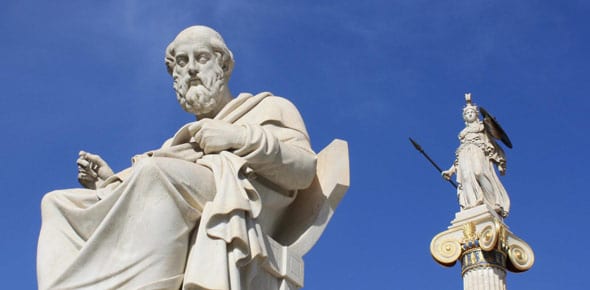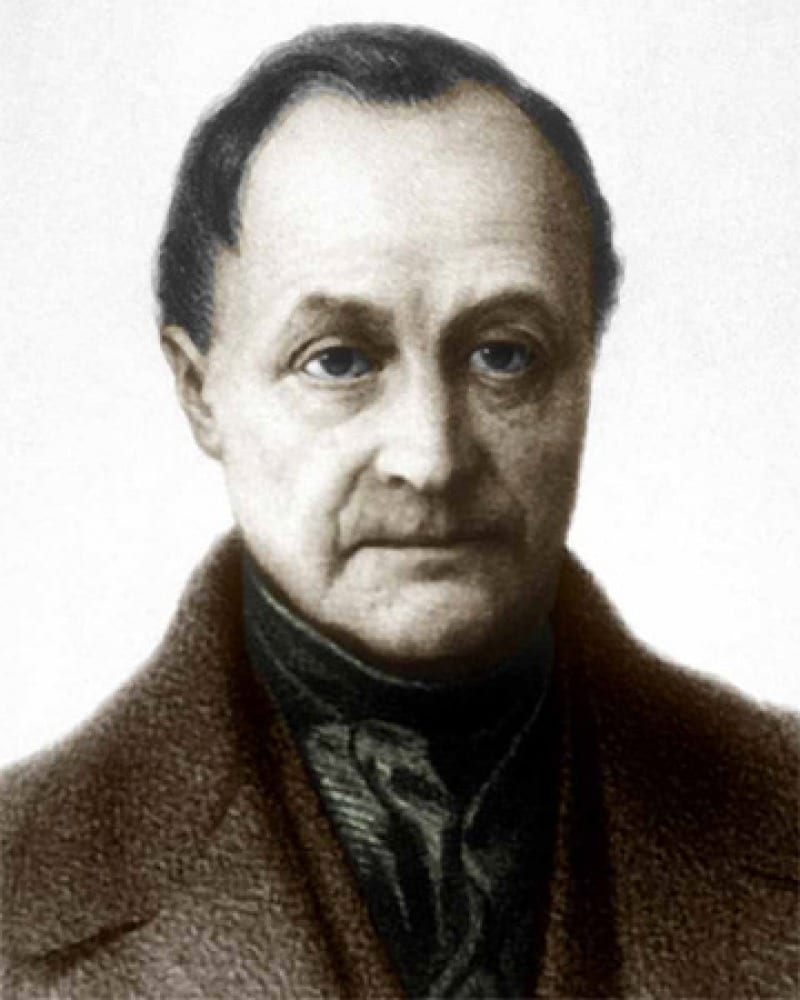3 Waves of Objections/Somatic Unit of Polis (449a-474a; V.1–V.16)
Socrates is about to embark on a discussion of the unjust political regimes and the corresponding unjust individuals when he is interrupted by Adeimantus and Polemarchus (449a-b).
Men/women are equal in nature (449a-457c)
(449b-d) They insist that he needs to address the comment he made earlier that the guardians will possess the women and the children of the city in common.
(450a-451b) Socrates reluctantly agrees and begins with the suggestion that the guardian women should perform the same job as the male guardians.
(451c-d) Socrates agrees and starts with the women guardian topic: if men and women differ only in reproduction, but are just less capable though still capable of everything, then women should be guardians too – just weaker ones. So they should just have lighter jobs.
(456c) Socrates goes on to argue that the measure of allowing the women to perform the same tasks as the men in this way is not only feasible but also best. This is the case since the most suited people for the job will be performing it.
Community of children/wives (457d-472a)
(457c-d) Socrates also proposes that there should be no separate families among the members of the guardian class: the guardians will possess all the women and children in common. Socrates proceeds to discuss how this measure is for the best and Glaucon allows him to skip discussing its feasibility (458a-c).
(458d-459d) Eugenics: The best guardian men are to have sex with the best guardian women to produce offspring of a similar nature. In order to guarantee that the best guardian men have sex with the best guardian women,
- The city will have marriage festivals supported by a rigged lottery system (459e-460a).
- The best guardian men will also be allowed to have sex with as many women as they desire in order to increase the likelihood of giving birth to children with similar natures (460a-b).
- Once born, the children will be taken away to a rearing pen to be taken care of by nurses and the parents will not be allowed to know who their own children are (460c-d). This is so that the parents think of all the children as their own.
- The children should have the same common reverence for elders and go out with their fathers to learn about war.
- Socrates recognizes that this system will result in members of the same family having intercourse with each other (461c-e).
(462a-465d) Unity: Socrates proceeds to argue that these arrangements will ensure that unity spreads throughout the city. The best states are the most united, even if small. Greeks should not kill every greek but just take some of their food when conquireed.
(465d-e) Guardians will be happy: Responding to Adeimantus’ earlier complaint that the guardians would not be happy, Socrates indicates that the guardians will be happy with their way of life; they will have their needs satisfied and will receive sufficient honor from the city . Thereafter, Socrates discusses how the guardians will conduct war (466e).
Rule of the Philosophers V.17–VI.14. 471c–502c.
(471c-e) Glaucon interrupts him and demands an account explaining how such a just city can come into being. Socrates admits that this is the most difficult criticism to address (472a).
The philosopher-king (472a-474a)
(472b-473b) Then he explains that the theoretical model of the just city they constructed remains valid for discussing justice and injustice even if they cannot prove that such a city can come to exist.
Defense of the philosopher-king (474a-541b)
The theory of forms (474a-480a) Bk. VI
(473c-d) Philosophers become kings or kings, philosophers: Socrates claims that the model of the just city cannot come into being until philosophers rule as kings or kings become philosophers. He also points out that this is the only possible route by which to reach complete happiness in both public and private life (473e), the most philosophical rulers end with the most political power. But they will be scorned for this.
(475e) Philosophers love and pursue all of wisdom (475b-c) and they especially love the sight of truth, just like lovers of wine have discerning taste. They don’t love speeches and songs that are beautiful but beauty itself. The others love instances of beauty and deny beauty exists.
(476a-b) In the single Form, philosophers are the only ones who recognize and find pleasure in it – that form is behind the multiplicity of appearances. Concern for novelty is not a sign of a philosopher.
(476d) Socrates distinguishes between those who know the single Forms that are and those who have opinions. There is no middle between existing and not existing – science knows what is.
(476e-477e) Those who have opinions do not know, since opinions have becoming and changing appearances as their object, whereas knowledge implies that the objects thereof are stable.
- If different faculties are related to different objects (abs. certain, vs. opinion)
- and if both opinion and science are faculties different from each other
- Then knowledge is not the same as opinion
- If what exists is knowable, then the same thing other than what exists is opinable. Opinion is neither ignorance nor knowledge, but falls b/n the two.
Some deny the existence of the beautiful in itself but still love instances of beauty. Sense Doxa Phenomenal, Intellect Episteme Being.
Philosophy and Practicality (484a-502d)
(484) Enlightened and the Blind. Socrates observes that most people can’t and won’t become philosophers – grasping the eternal – and instead most will wander about with many guises and interest in concerns, and this is as good as blind. A reference point, study and preservation of what has been handed down is needed. The philosopher will be defined.
(485b) Socrates wants someone who has devotion to learning, what is eternal, and doesn’t flutter between growth and decay.
- they love what is rather than what becomes (485a-b) – they don’t flutter between growth and decay,
- they hate falsehood (485c) would never lie, and loves truth from childhood
- they are moderate (485d-e), passions are in order, not greedy,
- they are courageous (486a-b), never afraid of death,
- they are quick learners (486c),
- they have a good memory (486c-d),
- they like proportion since the truth is like it
- they have a pleasant nature (486d-487a).
(487) Word games, no; Weirdos, yes. Adeimantus agrees but points out most philosophers are freaks and tricksters, so no one will listen to them.
(488a) Ship of State. Socrates gives Ship of State metaphor in answer.
- A crew is fighting over navigating a ship that everyone wants
- None have the skill or can say where they might have the skill to rule.
- All agree it is not a skill based on knowledge or expertise, and constantly beg the captain to entrust it to them.
- Some fail, some succeed in convincing him.
- Fake philosophers undermine the captain and use the ships resources wasting it away. The good ones help.
- The fakes praise anyone to the captain, who would favor their advancement
- No one has the skill or general awareness of the season, the weather, stars, wind and all else related to sailing
- They don’t think its possible either to gain such knowledge – everyone has the same sense experience looking at the sky.
- The captain gets called a stargazer, idle talker, and useless to them by the men he governs.
(489) Many want to be philosophers but can’t be. Captains don’t beg to rule, people should beg the captain. They don’t because there are so many fake philosophers that the whole profession appears useless.
(490) It requires standing for the truth always. It is not easy to be well regarded by those who practice the opposite (including those who want to be called philosophers and to rule). The truth, however, must be his leading principle, even when most people think he is a liar. He should fight for the truth with all his virtues.
(491) Why are the majority evil? When people are told that the cardinal virtues are actually evil, or when beauty wealth strength or power corrupt. The corruption of the best is the worst, others are just mediocre.
(493) Can avoid corruption by proper education and nurture/environment. Sophists learn to manipulate the masses by A/B testing.
(494) The majority will never know the truth and always disparage philosophers
(495) There are many obstacles for the good-natured boy who loves wisdom: parents who want their talents to be used to make money, flatterers/craftsmen, others courting them, other worldly successes.
(496) Politics and deceit makes the true philosopher want to hid under a bridge during the storm, seeking exile or to be ignored instead of ruling. (pope benedict)
(497) But the constitution of a state must be preserved from change at all costs, which the vicious and those desiring to rule will do immediately thinking they know better.
(498) Explains life course of philosopher: most give it up before it gets good.
(499) The state can’t succeed without the philosopher king.
(500) Socrates says that the masses will support the philosopher king only if he shows consistency, regulation, does not wrong and is orderly. They want to make sure he isn’t playing word games like most who claim they are philsophers.
(501) The masses are shamed into accepting him in the way a sick person must seek a doctors help. They feel they cannot do it on their own.
The study of the good (502d-521d; VI.19–VII.5.)
(502) With the right education, just about any family could produce a good philosopher.
(503) The sharp witted finding learning easy, peaceful etc. are perfect candidates.
(504) They should have a strong sense of being perfect, can’t accept imperfection. They take the long but better road.
(505) They must value the good above all else, for itself, and the appearance of the good is to be disparaged (human respect). Most people sense the good but can’t grasp it or form a stable believe about it – they can.
(506) The guardians can’t guard if they don’t know what they are guarding: they most of all can’t be in the dark, and must be able to talk about what they know, not about mere opinion. He will use images of the good:
Sun image (506a-509d)
(507) The Good : The Mind : Understanding The Sun : Sight : Seeable thing
As the sun illuminates objects so the eye can see them, the Form of the Good renders the objects of knowledge knowable to the human soul. As the sun provides things with their ability to be, to grow, and with nourishment, the Form of the Good provides the objects of knowledge with their being even though it itself is higher than being (509b).
Divided line (509d-511e)
(509) The good is beyond being in rank and power. Glaucon is impressed and asks for more.
(510) Four types of knowledge, moving step by s tep from first principle with widest extension:
- Doxa: Images, shadows, reflections in the water and on the surface (Cave dwellers)
- Pistis: Living creatures, natural things and artificial things (Surface dwellers after adjustment)
- Dianoia: Forced to investigate from hypothesis -> to conclusion by visible things (Surface observation points to the sky)
Episteme: Transcends visible world from hypothesis -> first principle (form ideon).
Socrates offers the analogy of the divided line to explain the Form of the Good even further (509d-511d). He divides a line into two unequal sections once and then into two unequal sections again. The lowest two parts represent the visible realm and the top two parts the intelligible realm. In the first of the four sections of the line, Socrates places images/shadows, in the second section visible objects, in the third section truths arrived at via hypotheses as mathematicians do, and in the last section the Forms themselves. Corresponding to each of these, there is a capacity of the human soul: imagination, belief, thought, and understanding. The line also represents degrees of clarity and opacity as the lowest sections are more opaque and the higher sections clearer.
Analogy of the Cave (514a-521d) Bk. VII
(514a-517c) Socrates continues his discussion of the philosopher and the Forms with a third analogy, the analogy of the cave .
(518c-d) This represents the philosopher’s education from ignorance to knowledge of the Forms.
- True education is the turning around of the soul from shadows and visible objects to true understanding of the Forms.
- Philosophers who accomplish this understanding will be reluctant to do anything other than contemplate the Forms but they must be forced to return to the cave (the city) and rule it.
- They will also be mocked for not being able to see in the dark. Philosophers rule for the good of the whole.
Program of higher education of philosophers (521d-541b; VII.6–VII.18.)
(521d) Socrates proceeds to outline the structure of the philosopher king’s education so that they can reach an understanding of the Forms. When the beggars of the king enter public service, the government becomes a competition which leads ultimately to civil war and destroys the state. Lovers of government should not be allowed. These three images were about constructing the best state in the ideal.
(521d-e) Those who eventually become philosopher kings will initially be educated like the other guardians in poetry, music, and physical education:
- Then they will receive education in mathematics: arithmetic and number (522c), plane geometry (526c), and solid geometry (528b).
- Education that contains the lower is #1 uniting and all the many it contains it. Sense perceptions don’t tell you about contraries: finger and not a finger, or e.g. hard and soft at the same time is not given by sense. That comes from the mind, but its in the craftsman, the soldiers and the philosophers experience.
- The understanding sees large and small as two – separately, unlike sense. From this we ask “what is large?” and “what is small?” (intelligible)
- If #1 can be seen by itself, then it would nto draw the soul to the real. But if something is always seen @ the same time with its own opposite then ther emust be a reason for this and the soul looks for it.
- Socrates asks (G) about “unchoppable” units and G says you can only think of one at a time. S observes that mathematicians learn faster than others in the long run even if there is no immediate benefit.
- and astronomy (528e),
- Astronomy makes one look up and leads to philosophy but Socrates thinks it must be distinguished – outer space and the heavenly bodies are themselves governed by invisible forms. Astronomy without universals is absurd.
- and harmonics (530d).
- Eyes –> heavens : Ears –> Harmony. Abstract number.
- Harmony is different from astronomy because it finds beauty more. But how can we teach?
(532a-535a) Then they will study dialectic which will lead them to understand the Forms and the Form of the Good (532a). Socrates gives a partial explanation of the nature of dialectic and leaves Glaucon with no clear explanation of its nature or how it may lead to understanding.
- If there is no starting point and no end, there is no knowledge. only this dialectical method, using contraries establihes certainty: conjecture and beliefs are doxa, and these are not permanent. Thought and knowledge are real and permanent. Dialectic is the keystone of education.
(535a-540b) Then they discuss who will receive this course of education and they are to study these subjects 3-5 years. The ones receiving this type of education need to exhibit the natural abilities suited to a philosopher discussed earlier.
(539e-540c) After the training in dialectic the education system will include fifteen years of practical political training to prepare philosopher kings for ruling the city.
(540e-541b) Socrates concludes by suggesting that the easiest way to bring the just city into being would be to expel everyone over the age of ten out of an existing city from the customs of forefathers.


